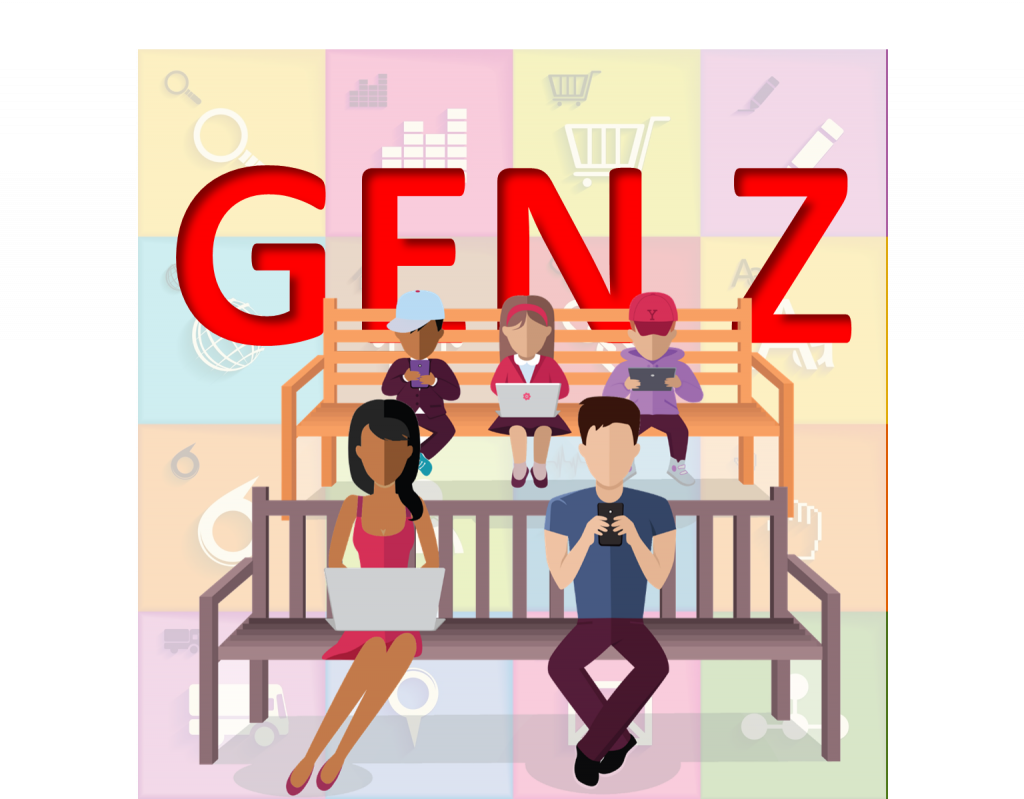Members of Generation Z (children born between roughly 1996 and 2010 and sometimes referred to as “centennials”) are the new darlings of marketers. According to some analysts, they control $44 billion in direct purchasing power and report being either “very strong” or “strong” influencers over family decisions.[1] Laura Klepacki reports, “In a blow to the ego of millennials everywhere, Goldman Sachs researchers say that the Gen Z cohort now matters more.”[2] Here’s the rub. According to John Jurgensen (@johnjurg), “The Gen Z audience, which watches video from a wide variety of online platforms and which often embraces self-made stars, is tough to capture.”[3]
Capturing Generation Z’s Attention
“While targeting each generation is a must for most retailers,” writes Cara Salpini (@CaraSalpini), “there’s one group in particular that’s bound to draw a marketer’s attention. Gen Z — that class of digital and social natives that has everyone buzzing — is still a developing consumer group, but it’s one that retailers have become particularly interested in. While older members of Gen Z (roughly the 16-22 year-olds) are a retailer’s primary focus right now, the younger ones are maturing quickly and, by some measures, they’re already ready to interact with brands.”[4] Salpini points out one reason capturing the attention of Gen Zers is difficult — they range in age from children to young adults. Needless to say, young children and young adults have very different interests. Katherine Cullen, director of consumer research at the National Retail Federation, told Salpini why it’s important to target this young generation. “While Gen Zers may not hold the purse strings, or necessarily control the money that they’re using,” she stated, “they’re still expected to have input and they do have input.” Below are a few suggested ways to capture Gen Zers’ attention.
Get them interested. Oded Edelman, president of JamesAllen.com, writes, “Gen Z shoppers have notoriously short attention spans and click on fewer ads than millennials (59% versus 71%). To grab their attention, video ads must be concise and relevant to their target market.”[5] If you are wondering why Edelman only mentioned videos, it’s because 95% of Gen Zers use YouTube.[6] Salpini suggests story telling is a good way to make videos relevant. “Having grown up with social media platforms,” she explains, “most Gen Zers are used to visual forms of storytelling from brands — in fact they prefer it.” Another reason to focus on video marketing is because Gen Zers’ favorite screen is found on their smartphones.
Get them involved. Gen Zers are looking for unique experiences. According to Edelman, “Businesses [should] use the latest digital technologies to create interactive, engaging experiences. A recent survey found that 42% of Gen Z shoppers would participate in an online game that’s part of a campaign.” Salpini adds, “Gen Z wants branded experiences — that also means that the younger generation is much more willing to experiment with ‘out-there’ retail concepts than baby boomers. Members of the centennial class want to interact with their favorite brands, and are willing to do so in creative ways. … Marketers would do well to tailor fun, creative and engaging experiences toward this young group to get the most mileage out of them — especially on mobile apps and social platforms, where Gen Z spends more time and makes more purchases than other generations do.”[7] Brands also need to understand that Generation Z is more socially-conscious than previous generations and getting them involved could mean engaging them in social causes.
Personalize your efforts. “Gen Z shoppers want a personalized experience that starts with a quick and simplified search and discovery process,” writes Edelman. “Product personalization is a major selling point these days, as Gen Zers are all about expressing their individuality through their purchases.” Salpini adds, “A study by Yes Lifecycle Marketing found that 35% of the generation look for personalized gifts when they’re buying for others.”
Speed up the check-out process. Edelman writes, “Shopping is moving from physical stores to the online space, yet technology still has a place in the traditional shopping experience — be it in the search and discovery stage, customer support, or at point of sale. The latter will likely be a retailers’ biggest expense, so think about upgrading the infrastructure now. Physical stores that allow customers to bypass the long lines and check out on their mobile devices will have a clear competitive advantage in the future.” Salpini reports a study by payments platform Adyen found “Gen Zers are eager to experience in-store tech while they shop, with 39% hoping ‘just walk out’ technology will be implemented within the next 12 months and 44% hoping AR and VR come to fruition during that same period.”[8]
Give them value. Salpini writes, “Gen Z is unlike any other generation in one big way — they value quality over price. In a recent study by Yes Lifecycle Marketing, over half of the group (57%) said that quality affects their brand loyalty the most and 50% said their last purchase was based largely off of the quality of the item. They also value brand prestige more than any other generation, with 11% saying it’s important to them. That goes along with a July [2017] study from InMarket, which found that the generation was more likely to buy luxury brands than millennials.”
Although those are good suggestions, there are no pat answers about how to reach Gen Z consumers. Peter Adams (@PatchAdams03) explains, “Marketers must break with traditional norms of segmenting and crafting their strategies around these young consumers — a sea change that will inevitably put strain on resources and budgets but is necessary as the age group matures into adult buyers.”[9] In the years ahead, cognitive computing systems will be used to help marketers, brands, and retailers understand this more complex consumer landscape. Because these systems can deal with more variables than previous analytic systems, they are well-suited to help reach Gen X consumers.
Summary
“The youngest, most baffling and most desirable demographic is Generation Z,” Salpini asserts. “Also known as centennials or ‘those kids that are poised to overtake retail,’ every marketer seems to have their eyes on the up-and-comers — and for good reason. The young group accounts for 60 million members of the U.S. population and 2.6 billion worldwide, according to Social Explorer.” Adams adds, “Gen Z’s distinct demographic makeup and general characteristics will inevitably have a much larger impact on the consumer landscape as the group continues to mature and gain more purchasing power.” In the years ahead, centennials will have significant impact on how marketing is conducted and cognitive computing systems will help marketers traverse the complicated consumer landscape.
Footnotes
[1] Peter Adams, “Why Gen Z might signal the end of demographic targeting as we know it,” Marketing Dive, 10 October 2017.
[2] Laura Klepacki, “The emerging portrait of Gen Z,” Retail Dive, 26 June 2017.
[3] John Jurgensen, “A Self-Made Star Shows One Way to Crack the Gen Z Code,” The Wall Street Journal, 26 November 2017.
[4] Cara Salpini, “3 ways to reach Gen Z during the holidays,” Retail Dive, 10 November 2017.
[5] Oded Edelman, “5 ways to win with Gen Z shoppers,” Retail Dive, 9 January 2018.
[6] Emma Bazilian, “Infographic: 50% of Gen Z ‘Can’t Live Without YouTube’ and Other Stats That Will Make You Feel Old,” AdWeek, 21 May 2017.
[7] Cara Salpini, “The definitive guide to generational marketing,” Retail Dive, 20 October 2017.
[8] Cara Salpini, “Gen Z wants more in-store tech,” Retail Dive, 26 September 2017.
[9] Peter Adams, “Why Gen Z might signal the end of demographic targeting as we know it,” Marketing Dive, 10 October 2017.





